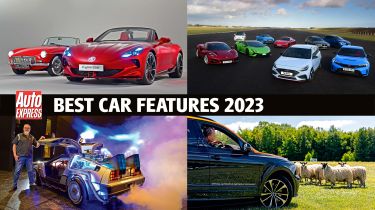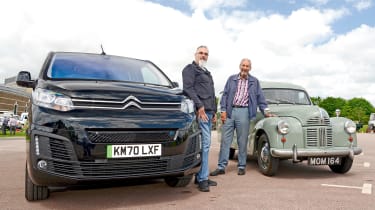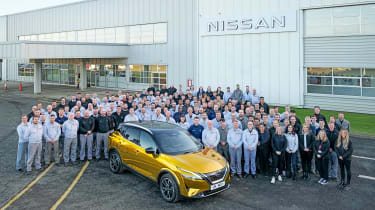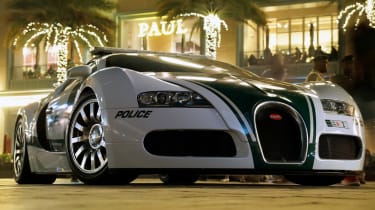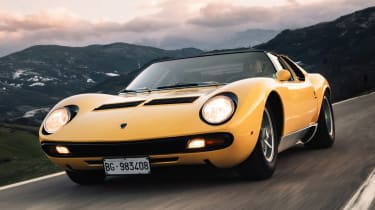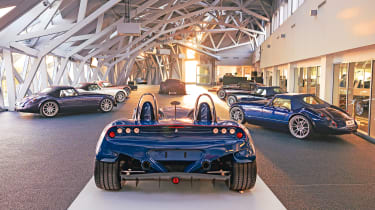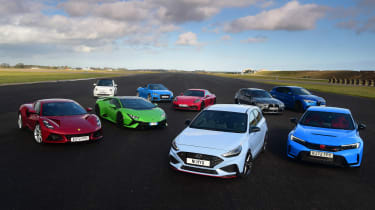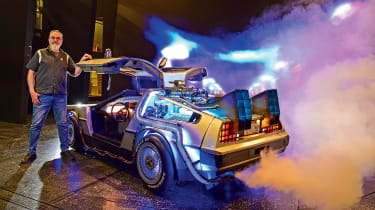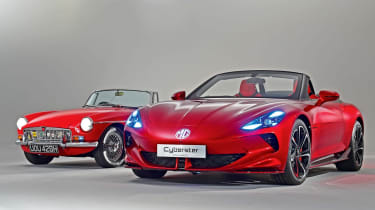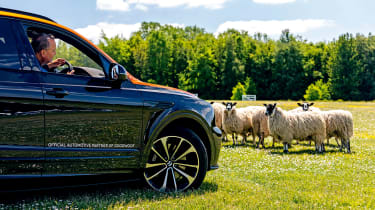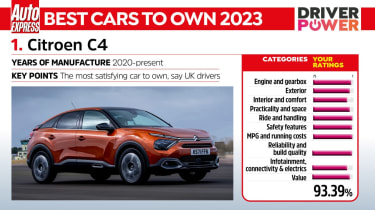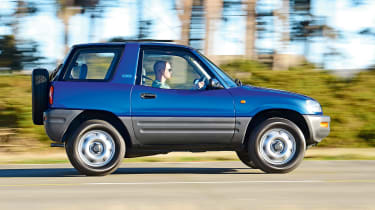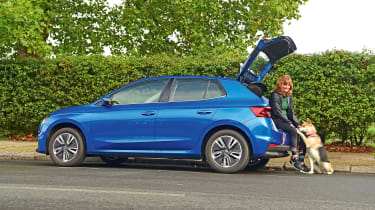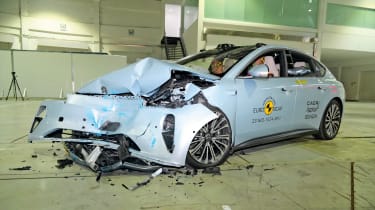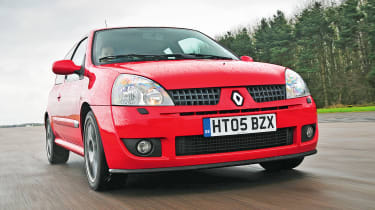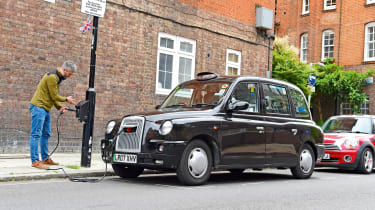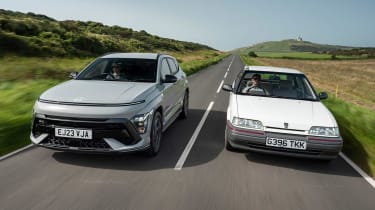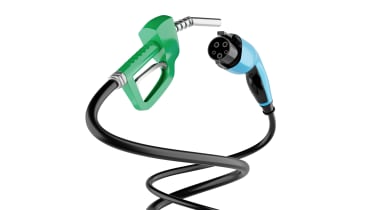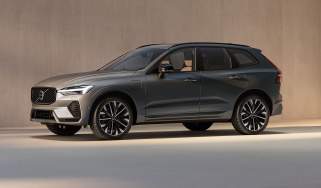The world of cars uncovered: our deep-dive feature highlights of 2023
Our favourite features of 2023 cover the entire motoring spectrum…
Every week Auto Express takes a look behind the headlines and enjoys a deep dive in the automotive world with our feature stories. Variety is the spice of life, as the saying goes and we’ve had a fantastic time bringing you the inside line on people, products and issues from right across the wide motoring spectrum in 2023.
Choosing our favourites was a tricky task but below you’ll find a full round-up of the most memorable areas we’ve explored in detail over the course of the last 12 months. From exotic police cars, dogs in cars and icon drives to virtual reality, building a Bentley and one very special birthday, it’s all there. Take a look…
The best Auto Express features of 2023...
January
Old meets new at commercial expo
It’s not only cars that get us excited here at Auto Express, and the start of the year saw us find more like-minded van fans by travelling to the Classic Commercial Vehicle show. The British Motor Museum in Gaydon, Warwickshire, played host to a wide range of delightfully cherished vintage vans.
A 1952 Austin A40 Devon was among the gleaming classics on display, while one of the latest vans, the Citroen e-Dispatch we brought to the show, made for an interesting comparison with the electric Bedford CF from the seventies.
February
The golden touch
Most of the time when we drive around in a Nissan Qashqai, we don’t get very much attention. After all, it’s one of the most commonly seen cars on the road – indeed, the Japanese brand sold 42,704 of them back in 2022 alone, making it the year’s best-seller.
But when you decorate one of those 42,704 cars in a gold wrap, you certainly get plenty of stares from other motorists. It’s something we discovered when we took the shiniest of all Qashqais on a British road trip to celebrate the model’s success – and talked to some of the key players who made such a huge contribution to where it stands today.
Our journey started in Paddington, London, where we met Nissan’s vice president for design in Europe, Matthew Weaver, at the trendy Nissan Design Centre. It was here where the concept for the Qashqai originated; at a time when the Japanese brand’s Almera family hatch was faltering against rivals such as the Ford Focus and VW Golf, Nissan decided a radical rethink was needed.
As a result, it scrapped the plans for a traditional rival that, as Weaver told us, was already “all sewn up” from a design point of view. Nissan bosses pushed for something different, something that, according to Weaver, would “have presence and be robust, but not be overpowering and anti-social”. The result was not a full-fat SUV, more a hatch with slightly taller proportions, which set the template for each subsequent generation – each designed in the UK.
Next, our trip took us to the Nissan Technical Centre Europe in Cranfield, Beds, where Dave Moss, Nissan’s senior vice president for research and development, was waiting. He talked us through how Nissan’s reputation for 4x4s and SUVs was a plus point to be exploited, but how buyers would still demand the efficiency of a traditional hatch. Moss told us how he’d spent two years developing the Qashqai in Japan before returning to Cranfield to fine-tune its qualities, delivering what he is proud to say, in the case of the Mk3, has become such a “well rounded product”.
Finally, we wanted to meet the people responsible for building every single Qashqai. That meant the final stop of our tour took us to the North East, to Nissan Motor Manufacturing UK just outside Sunderland, Tyne and Wear. The 6,000-strong workforce produced 238,329 cars there in 2022 alone, making it one of Britain’s greatest current manufacturing success stories.
Lee Watson, who took us around the trim and chassis production lines, showed us the hypnotisingly efficient process of putting a Qashqai together – something that he admitted to us has become ever more slick with each passing generation, because design and technology have improved so much since the factory first opened in 1986.
Police with exotic taste in cars
While most forces might usually stick to sensible police cars, every once in a while there’s a thrilling exception. Some nations have one-offs just for show – take Dubai’s Bugatti Veyron, for example – but other cars have been put to great use.
Humberside police used a Subaru Impreza Turbo 2000 as a pursuit vehicle in the nineties, while the Italian police’s Azzurro blue Lamborghini Huracán was used to transport kidneys for valuable operations.
March
Icon Drive: Lamborghini Miura
It was in March when we were given a chance to drive Lamborghini’s own Miura. You try to give a dignified ‘yes’ to such an offer, but the cool facade drops as you walk over to a bright yellow Miura parked in front of the factory.
Company executives, factory personnel, visitors and, most worryingly, the engineers who have maintained the Miura all line up to watch you crawl in a convoy exiting the grounds. Funnily enough, the Miura is far easier to drive than its reputation suggests and that’s our abiding memory of the car.
Tantalising mix on offer from Wiesmann
Wiesmann’s CEO calls the firm the “Aston Martin of Germany” and while we hesitate to say it’s that well known, it is every bit as fascinating.
The firm’s formula of combining British style and German engineering gave us tantalising cars like the MF3, 4 and 5 using straight-sixes, V8s and V10s from BMW’s M division. Looking ahead to Wiesmann’s future, we got behind the wheel of its upcoming EV, codenamed Project Thunderball. Our early impressions were that after a few engineering tweaks, we could have a seriously fun electric roadster on our hands.
April
Buy top ICE cars before they die
Electric cars are coming whether you like it or not. Here at Auto Express we understand that many of you may feel apprehensive about the switch to electric and might want one last hurrah in a good old-fashioned internal-combustion engined vehicle.
So rather than wait for our heroes to fall by the wayside, we came up with the best new ICE cars that money can buy. Our list ranged from the affordable Fiat 500 to the dreamy Lamborghini Huracán to prove there’s still lots out there for the petrolheads amongst you.
Blown away by epic B&W hi-fi
We met up with British company Bowers and Wilkins to find out what goes into making a premium car’s sound system. As one of the leaders in automotive audio, Bowers and Wilkins has fitted stereos to models from Porsche, Jaguar, Volvo, McLaren, Maserati and BMW.
But its latest and greatest set-up is fitted to the BMW i7: a 36-speaker arrangement with a 1,924W output. We got a chance to hear it in action and the sound quality was sensational; we felt like the band was in the car with us. You really have to hear it, to believe it.
May
Great Scott! DeLorean on the stage
We highlighted a rare tie-up between the worlds of automotive and theatre, with a behind-the-scenes look at Back to the Future: The Musical – specifically, the stunning DeLorean that’s part of the show.
The ‘car’ is a 95 per cent-scale model, because a proper DeLorean would have looked too large on the stage. The painstaking approach to developing the prop has paid off, though; even with eight performances a week, the tech crew joked that it’s the most reliable part of the show.
How recycled parts are helping to cut the cost of motoring
The cost-of-living crisis and supply issues for new cars have forced many motorists to keep their existing used cars on the roads for longer. Could parts recycling be a useful way of cutting costs further? We paid a visit to a huge facility at the heart of this fast-expanding market, capable of cannibalising cars and selling more than 3,000 recycled components every week.
With huge online market eBay now targeting recycled car parts as an area of growth, we were keen to see how the process removed and graded components – and discover how much customers could save by choosing second-hand recycled parts instead of brand-new ones.
Staff at Charles Trent Ltd in Dorset studied each vehicle, identifying key parts to get a potential value. Then every car was put on a jig for ‘depollution’, sucking out key fluids – including fuel, which was resold to employees at a knock-down price. By the time components of value have been removed, all that was left was a bare shell that could be sent to the crusher. We were told the facility can hold 71,000 parts in stock, including 1,500 complete engines and the same number of gearboxes.
The market is evolving quickly, with Charles Trent planning to open five similar sites across the UK, while Renault is leading the mainstream manufacturers with a base for recycling in northern France.
Sample prices from eBay provided some evidence of why recycled parts are becoming more popular. Larger panels, such as a tailgate for a Vauxhall Corsa or a bonnet for a Nissan Qashqai, were around a third cheaper as recycled parts – while the savings increased on some smaller items, such as a side mirror for a VW Golf, which was more than 60 per cent cheaper second-hand.
June
Cyberster leads MG’s future
MG’s rebirth over the past few years has been nothing short of remarkable – and we celebrated the past, present and future of the brand.
The firm’s commercial boss in the UK, Guy Pigounakis, reflected on his time with MG and highlighted the cars that have charged its race back up the sales charts – the ZS, HS, MG4 and MG5. Guy also outlined the challenges of maintaining such an amazing rate of (re)growth: “I keep trying to explain to my boss that if we keep growing at 66 per cent, we’ll be the only people selling cars in the UK in four years’ time!” he joked.
Looking to the future, we brought MG’s stunning new Cyberster in for an exclusive studio shoot, with the brand’s UK design boss Carl Gotham walking us around the fascinating all-electric roadster. “It’s not a petite car,” he admitted, “but if you look at the MGB, the proportions are still relevant, and quite elegant.”
That comparison with the MGB – the roadster most fondly remembered (and curated) by classic-car aficionados – was particularly valid because of the second aspect of our shoot. A beautiful bright-red example of the classic model was wheeled in alongside the dramatic curves of the Cyberster.
“With these cars side by side, you can see how they share some fundamental aspects,” our senior staff writer Jordan Katsianis commented. “The Cyberster’s bonnet is long, the cockpit compact and that all-important dash-to-axle ratio is just as generous. Yet from here, it’s also clear that in contrast to retro-pastiche designs like the MINI or Fiat 500, the Cyberster’s direction is firmly future-facing.”
To round up our special, we paid a flying visit to a couple of key MG sites in the UK – the firm’s headquarters in Marylebone in London, which includes a showroom, and Longbridge near Birmingham. The latter was formerly a manufacturing site, of course, but these days it’s home to an engineering team that has vital input into vehicles that are being developed in China. MG is a very different company from 20 years ago – but that UK input is playing its part in its success not only here, but also globally.
Steve is best baa none herding sheep
We’ve brought you some left-field stories over the years at Auto Express, but sheepherding in a Bentley Bentayga has to be right up there with the best of them.
We’re reliably informed the sheep entered the right part of the field as well, as editor-in-chief Steve Fowler performed his own version of One Man and his Dog in front of thousands of people at Goodwoof – basically like the Festival of Speed, but for dog lovers. Steve even topped the scores on the day in West Sussex, although we understand the prize is still in the post.
You rate top cars
We put our heart and soul into testing cars ourselves at Auto Express, but there’s still nothing quite like the annual Driver Power survey, where thousands of you give your warts-and-all views on the cars you’ve spent your own money on. The data and views that emerge from our army of respondents are useful for car makers themselves – but are also a must-read guide to how good (or bad) many of the big-selling models are to own.
This year’s rundown was no exception, with the UK’s most eagerly awaited car-ownership survey delivering a fascinating 75-strong list – and a first-time winner for Citroen, thanks to the C4 and e-C4. Owners rated the family hatch’s ride smoothness above all other models – a great result for a brand renowned for its comfort – but it scored well in pretty much every area, including reliability. These results were ultimately enough for Citroen to claim the top spot, beating the current Kia Sorento, the Mk4 Lexus RX, Dacia Duster and Subaru Outback. Five models from five different brands in the top-five places shows how customers are willing to back the vehicles that work for them, regardless of where they come from.
Elsewhere, Driver Power also proved once again that even though some models don’t get sensational reviews, they can be loved by their buyers over longer periods of time. Ford’s EcoSport, for example, has rarely been a car that we’d recommend in tests. Yet the small SUV finished in sixth-position overall, with its owners praising the Ford’s steering response, front-seat comfort and infotainment.
The bottom end of the 2023 Driver Power list included some well known names – including, in 75th, the second-generation Vauxhall Mokka. A close relation of the winning Citroen (it’s based on the same platform and features many of the same powertrains), the Mokka flunked out on interior space and quality, practicality and reliability.
But it wasn’t just mainstream models that struggled; owners pulled no punches on the Range Rover Evoque, voting the British-built premium SUV into 73rd place overall and ranking it dead last for reliability, running costs and value. Ouch.
GM’s Harvey on top of our Brit List
Our annual rundown of the top-50 British executives in the global car industry saw quite a bit of movement inside the top 10, with a big jump for Wayne Griffiths, boss of Cupra and SEAT, up to the number-three spot.
But he was trumped by former Vauxhall chief Ross Harvey, who landed a plum job at the head of General Motors North America shortly before our judging session. His inbox must be bulging, because the global bosses of Chevrolet, GMC, Buick and Cadillac also report into him.
July
We focus on brands from the past
Week in, week out, Auto Express celebrates the latest and greatest that the motor industry has to offer. But in July we looked back at some of the iconic brands that are no longer with us – from the likes of Happy Eater to Blaupunkt – companies that in their heyday were integral to the lives of so many British motorists.
Our trip down memory lane referenced the Green Cross Code, Granada Service Stations, Moss Alarms, Vauxhall’s Network Q, Motorail and National fuel stations.
Celebrating RAV4’s ‘iconic’ status
Our Icon series continued in July with a feature on the original Toyota RAV4. Arguably the first compact crossover, the model was launched in 1994, more than a decade ahead of the popular Nissan Qashqai.
The ‘Recreational Active Vehicle with four-wheel drive’ (RAV4) was an instant sales hit with its off-road ability and SUV style, in a package more adept at tackling the school run. One owner told us she was so passionate about her RAV4, she wants her family to take her to her funeral in it.
August
Keeping your dog happy on the move
Cars and dogs – a lot of us have both, but do we really know how to best combine the two for the good of our furry four-legged friends? We got in touch with the Dogs Trust charity to dispel some rumours, and to give you, our readers, a better understanding of all the dos and don’ts of driving with dogs in the car.
We even listed out our top 10 favourite models for the job, taking into account boot loading height, how easy the space is to keep clean, and any made-to-measure accessories to ensure your pooch is happy and your car stays spick and span.
Jaguar’s future
What is going on with Jaguar? It’s a question that has been posed for quite some time now, yet has come with many different answers over the years. Auto Express editor Steve Fowler get some time with new CEO Adrian Mardell, to see where he intends to take the famous brand as it moves forward.
We already know it leads on pure electrification, because the basic overview of Jaguar’s future plans involves creating a range of super-high-end electric models, showing it is less concerned with volume and more interested in profit margins. Yet beyond this wider aim, specifics as to what we might expect in showrooms in a few years’ time had remained largely thin on the ground.
Picking up from where former boss Thierry Bolloré left off, Mardell revealed the brief given to the team. “Thierry asked them to come back with just four words to explain the emotion and what the brand actually stands for; these were exuberant, unique, fearless and progressive.
“That took me back to when I was a nine-year-old boy, and my first experience with Jaguar. My dad was a painter and decorator; he worked for a builder, and the builder owned an E-Type. So as a nine-year-old, I spent an hour in a beautiful, sky-blue E-Type doing all the things boys would do – noises and switches and all that good stuff. Twenty years later, I started working for Jaguar – and that was 32 years, nine months and four days ago.”
He went on: “The designers then produced 18 full-sized clay models in three groups. Gerry [McGovern, JLR’s chief creative officer] asked 20 people to review those models, and 19 of us chose one particular design. That was from Massimo Frascella [JLR design director]. It did tick those four words – we think we’ve got a jaw-dropping design”.
As one of the UK’s most iconic brands, the stakes are high, and the cost to get all of this designed, developed and brought to market even higher. Will Jaguar succeed? We’ll have a much better idea this time next year.
NCAP takes criticism on board
Is Euro NCAP going too far in its demands for ever-increasing levels of safety tech? Our report included feedback from brands such as price-conscious Dacia, which has been criticised for failing to include pricey tech, as well as a contrasting view from luxury EV brand Nio.
We also put driver criticism of over-intrusive safety tech to Euro NCAP’s technical director Richard Schram. He acknowledged the issue, and pledged the organisation would focus on performance and consumer acceptance.
MP’s views on ‘persecuted’ drivers
In a busy month for our editor, he put his local MP Greg Smith on the spot, asking if UK drivers are right to feel persecuted. The interview took place in car-enthusiast Smith’s Land Rover Defender, which runs on sustainable fuel.
The MP said there was a “big movement with an undertone of anti-car about it”, citing people who just don’t like private transport, and others taking a “false stance” on vehicles – including fans of London’s extended Ultra Low Emissions Zone. Smith also suggested the government should be more open to alternatives to EVs.
Auto Express staff’s hot hatch heroes
The full team got involved here, naming their top hot hatches from over the years. Supplementing our Civic Type R and A45 S road test, it featured our all-time favourites including the Peugeot 205 GTi, Talbot Sunbeam Lotus and Ford Fiesta ST.
It even incorporated some personal ownership tales, such as the sorry story of Jordan Katsianis’s dead MINI Cooper S. However, the stand-out for many was former associate editor Sean Carson’s love of his brother’s RenaultSport Clio 182, and the great drives Sean had in it in his formative years. If you’re after a cult classic, check it out.
September
Black cabs go green with EV tech
highly specialised firms are converting classic cars to run on battery power. But Aston Martins and Rolls-Royces aren’t the only British icons getting the EV treatment, because we drove two formerly diesel-powered taxis that had been given a new lease of life by Clipper Automotive.
They delivered the familiar electric vehicle driving experience, although the awkward seating position and noticeable clunks and creaks reminded us of the real age of these familiar workhorses.
We mark Auto Express’s 35th birthday
September 1988: the first copy of Auto Express hit newsstands, featuring a blend of news, road tests, scoops and consumer advice that proved a hit with readers, and laid the foundations for the magazine you’re reading today. We celebrated our 35th anniversary by looking back at events and seismic changes that have occurred in the motoring world over the past three-and-a-half decades.
The nineties saw the Volkswagen Group buy Skoda, Kia land in the UK, the groundbreaking McLaren F1 enter production and the Ford Focus get unveiled. Plus in motorsport, Colin McRae became the first British World Rally champion. The new century brought with it the rebirth of the MINI, the introduction of the London Congestion Charge, JLR’s sale to Indian giant Tata, and the fall of beloved brand Saab. More recently, Tesla rewrote every rulebook, the VW Group was rocked by the Dieselgate scandal, the Covid-19 pandemic brought everything to a halt, the now-delayed ban on sales of petrol and diesel cars was announced, and Chinese carmakers began to disrupt the market.
To illustrate the progress, we compared our 2023 Car of the Year – the Hyundai Kona – back-to-back with our first-ever cover car, the Rover 200. Unsurprisingly, they had very little in common, especially in terms of infotainment and powertrains, as the Rover relied on a faithful four-cylinder petrol engine, while the Kona we had used 21st-century hybrid technology.
Our staff also reminisced over some of the most important cars of the last 35 years, with the Nissan Qashqai, MINI R50, Dacia Jogger, Mk1 Mazda MX-5, Nissan Leaf and Tesla Model S all being mentioned.
October
Still no parity in EV vs ICE ownership cost
Inspired by Volkswagen Group UK MD Alex Smith, who claimed that ‘total cost of ownership’ for EVs was reaching parity with that of ICE cars, we did some number crunching across a range of pure-electric models – including the VW ID.3 versus Golf 2.0 TDI comparison cited by Smith.
For that pairing the three-year ownership cost was indeed equal, but we found the Vauxhall Corsa Electric could cost owners nearly £7,000 more than its petrol equivalent, while running an electric Nissan Leaf could cost the best part of £4,000 more than a like-for-like petrol Juke.
Crazy ‘gasser’-style Volvo drag car immortalised as Hot Wheels model
They say no one wants to see how the sausage gets made, but what about a Hot Wheels toy? Well we found out what it took to transform the first UK winner of the Hot Wheels Legends competition into a 1:64 diecast model, ready to tear up some of that iconic bright-orange track from our childhoods.
The car in question was a 1969 Volvo P1800, although unlike anything Roger Moore ever drove. This particular P1800, dubbed Ain’t No Saint, had been turned into a dragster inspired by ‘gasser’-style classic hot rods. Its distinctive stance was the result of a jacked-up front end that helped transfer weight over the back wheels for better traction on the drag strip. The P1800’s original four-cylinder engine was long gone, and in its place was a 460-cubic-inch (7.5-litre) ‘big-block’ Chevrolet V8 with a 6-71 GMC supercharger bolted on top. Some quick scrap-paper sums put power output at around the 650bhp mark – more than six times the muscle of a classic P1800 – while the car’s best quarter-mile time was 9.92 seconds.
The cartoonish look was completed by the open exhausts that dumped out right behind the front wings, close to the wheelarches, and Hoosier slicks on the rear that were each nearly a foot wide. Frankly, this car was always destined to become a Hot Wheels toy.
Ain’t No Saint’s owner, Lee Johnstone, told us about how his daughter was the one who entered the car into the Hot Wheels’ Legends contest back in 2020. It then won the UK and European legs of the competition, before beating nine other finalists to take the top prize and become immortalised as a Hot Wheels toy.
Now Hot Wheels had done just that. However, its design head, Manson Cheung, revealed that the graphic on the side sadly had to be changed, because it was too similar to the logo from the The Saint TV series.
November
John builds his bespoke Bentley
For any car fan, designing your own high-end supercar or super-SUV is a dream moment, and for editor-at-large John McIlroy it was one he ticked off his wish list by designing Auto Express’s ultimate Bentley Bentayga.
Using the full box of tricks from Bentley’s exclusive Mulliner bespoke program, John designed our Candy Red Satin Bentayga EWB with a matching Cricket Ball red interior. His creation cost over £100,000 more than the car’s base price of £220k. We know where to find John if his lottery numbers come up.
Just follow the link for the rest of our 2023 Review of the Year pages...
Find a car with the experts
